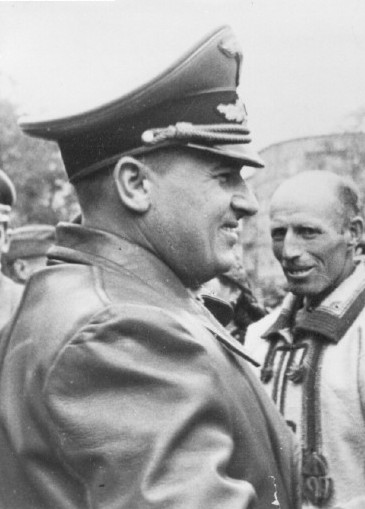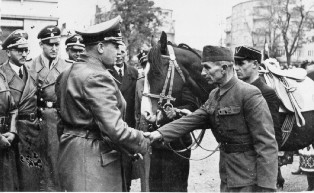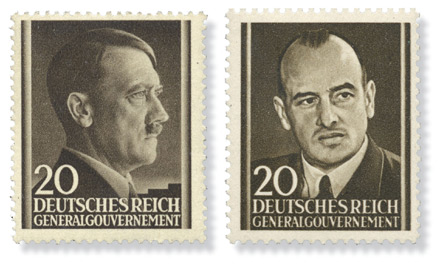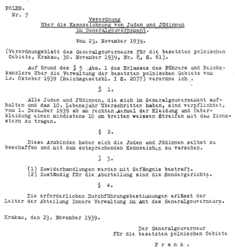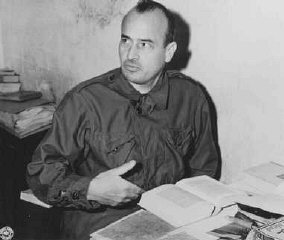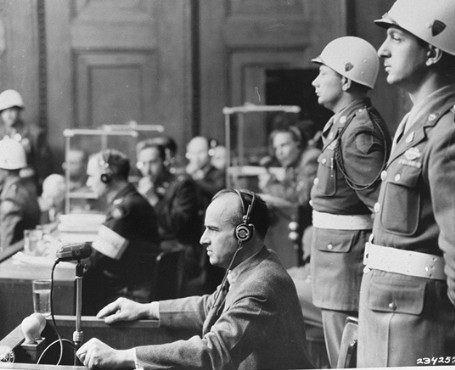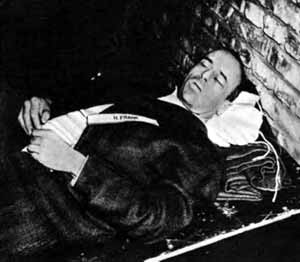Holocaust Education & Archive Research Team |
Aktion Reinhard
A-R Leadership A-R Articles
Action Erntefest Modern Research
| ||||||
Hans Frank
Frank was born in Karlsruhe, Germany on 23rd May, 1900, to lawyer Karl Frank and his wife Magdalena Buchmaier. He had an elder brother, Karl Jr., and a younger sister by the name of Elisabeth. He joined the German army in 1917. He served in the Freikorps and joined the German Worker's Party (which soon evolved into NSDAP), in 1919, being one of the party's earliest members took part in the Beer Hall Putsch.
He went on to study law, passing the final state examination in 1926, and rose to become the personal legal advisor to Hitler. When Hitler became Chancellor in 1933 he appointed Frank as Minister of Justice in Bavaria. While in this post he complained about the illegal killings that was taking place in the concentration camp at Dachau.
In 1930, Hilter entrusted Frank to research his ancestry in order to dispell rumors that Hitler had Jewish blood. "Frank undertook this delicate task, and he declared in the autobiography written in his cell at Nuremberg that what he discovered made it appear possible, if not likely, that Hitler's father had been half Jewish. The main facts are clear enough. Hitler's grandmother, a Fraulein Maria Anna Schicklgruber, worked as a cook for a well-to-do Jewish family named Frankenberger. The Frankenbergers had a son who was nineteen years old at the time Hitler's forty-two-year-old grandmother bore a child out of wedlock, and the Jewish family paid for the support of the child up to the time it was fourteen years old. Frank wrote that the money was given to avoid a public scandal.
Apparently, although Frank does not say so, Fraeulein Schicklgruber had threatened to bring a suit against the Frankenbergers. Frank wrote that many letters were subsequently exchanged between them and Hitler's grandmother, which seemed to him to be evidence of a cordial relationship. Nevertheless, both he and Hitler were convinced that the child was actually the offspring of a millworker, Johann Georg Hiedler, a second cousin of Fraeulein Schicklgruber, who five years after the birth of the child married her and legitimized her son.
But Frank, writing in Nuremberg no longer for the benefit of the Fuehrer, was also of the opinion that it was not out of the question that Hitler's father, who later changed his name from Hiedler to Hitler, was half Jewish."
In 1934, he aspired to Reichsminister without portfolio, the high point of his political career as from then on, others Himmler, Göring, Goebbels et al.), were ally vying for Hitler’s personal recognition and favours. Frank was never subservient when it came to the interpretation of the law and because of this, he had many fallings out over the draconian measures being introduced. In 1939, because of Frank’s legal contribution to the Führerstaat, Hitler made him president of the German Academy of Law. In September of that same year Frank was assigned as Chief of Administration to Gerd von Rundstedt in the General Government. From October 26, 1939, following the invasion of Poland, Frank was the Governor-General of the General Government for the occupied Polish territories (Generalgouverneur für die besetzten polnischen Gebiete), that is head of the General Government controlling those areas of Poland that had not been directly incorporated into Germany (roughly 90,000 km² out of the 170,000 km² Germany had gained).
He was granted the SS rank of Obergruppenführer and also tasked to oversee the segregation of the Jews into ghettos (Jewish quarters) and the use of Polish civilians as "forced and compulsory" Labour.
Hans Frank delivered the following speech on the Jews to an audience at Berlin University (November 18, 1941):
Later in life Frank was to refer to his time as Governor-General of Poland as 'the most terrible years' of his life and repeatedly pointed out that, contrary to appearances, he was 'an isolated, powerless man who had no influence on events'. In fact, from the very day of his appointment his jurisdiction was eroded from all sides, and it casts a revealing light on the disloyal duplicity of Hitler's policies towards his followers that from the outset he failed to give Frank any support in his struggle for authority, in particular support against the bid for autonomy by SS Obergruppenfuhrer Kruger, who was in overall control of the SS and the police in Poland. Hitler actually fostered the rival independent authority, though Kruger was formally subordinate to the Governor-General. The system of half-jurisdictions that were combined into total jurisdiction only at the summit, in the person of Hitler as the final arbiter— a system which we can observe throughout the Third Reich— subsequently resulted in a total disorganization that was quite obviously accepted as a necessary price to pay; it was also made the pretext for continual exhausting conflicts in which Frank, a man at the mercy of uncontrollable emotion, proved hopelessly inferior to the cold intriguer Kruger.
While Frank, obviously in increasing desperation, invoked his exclusive competence to give orders at sittings of the government, Kruger, under Himmler's protection, simply went ahead with his, or at least the SS's, conception of a policy for Poland.
Frank tried alternately to counteract this policy by one of relative leniency and reason towards the Poles, with occasional rudimentary attempts at cooperation, or to outdo the SS by even greater harshness, hoping by acts of terror and mass extermination to gain a reputation with Hitler and his entourage for National Socialist ability in dealing with the East.
His famous diary, which he handed over during his imprisonment in May 1945, contains in thirty-eight volumes, along with minute descriptions of the events of every single day during his period of government, countless passages designed to impress by their brutality. For example, when asked by a correspondent of the Völkischer Beobachter named Kleiss what was the difference between the Protectorate of Bohemia and Moravia and the government in Poland, Frank replied, "I can tell you a graphic difference. In Prague, for example, big red posters were put up on which could be read that seven Czechs had been shot today. I said to myself: If I put up a poster for every seven Poles shot, the forests of Poland would not be sufficient to manufacture the paper for such posters."
Frank was captured by American troops on May 3, 1945, at Tegernsee near Berchtesgaden. Upon his capture, he attempted suicide in which he tried to cut his own throat. After the attempt failed he tried suicide again on 5 May, when he lacerated his left arm. However, this failed too. After his arrest he was selected as one of the defendants in the Trial of the Major War Criminals before the International Military Tribunal in Nuremberg from 20 November 1945 to 1 October 1946. During the trial he renewed his childhood practice of Catholicism and, under the pressure of being on trial for his life, claimed to have a series of religious experiences.
Frank voluntarily surrendered over forty volumes of his personal diaries to the Allies, which were then used against him as evidence of his guilt. Frank confessed to some of the charges put against him and viewed his own execution as a form of atonement for his sins. On the witness stand he uttered:
"A thousand years will pass and the guilt of Germany will still not have been erased."
However, during the trial, he vacillated wildly between penitence for his crimes and blaming the Allies, especially the Soviets, for an equal share of wartime atrocities.
Sources:
Speech at Berlin University, Work Diary of Hans Frank, Yad Vashem Archives, JM/21. Rosenbaum, R, Explaining Hitler: The Search for the Origins of his Evil, Macmillan, 1998. Hans Frank, Lebensraum and the Final Solution by Martyn Houden Palgrave Macmillan 2004
Copyright CL H.E.A.R.T 2007
|
